BBAL401 Company Law: ASIC v Vines Case Analysis Report, Term 1
VerifiedAdded on 2023/06/10
|6
|1743
|293
Report
AI Summary
This report provides a comprehensive analysis of the ASIC v Vines case, addressing the issue of whether Geoffrey Vines breached his duty of care as a company director under the Corporations Act 2001. The report examines the relevant sections of the Act, including sections 180, 181, 183, and 184, which define the duties of care, diligence, and good faith. It explores the application of these principles to the facts of the case, where Vines, as CFO, was accused of negligence regarding profit forecasts. The analysis considers the level of negligence required to prove a breach of statutory duty, the information available to Vines, and the impact of market conditions. Ultimately, the report concludes that Vines was not liable, as he acted honestly and diligently, and the market downturn was beyond his control. The report references key legal precedents and scholarly articles to support its findings, and it is structured using the IRAC method (Issue, Rule, Application, Conclusion) to provide a clear and organized assessment of the case.
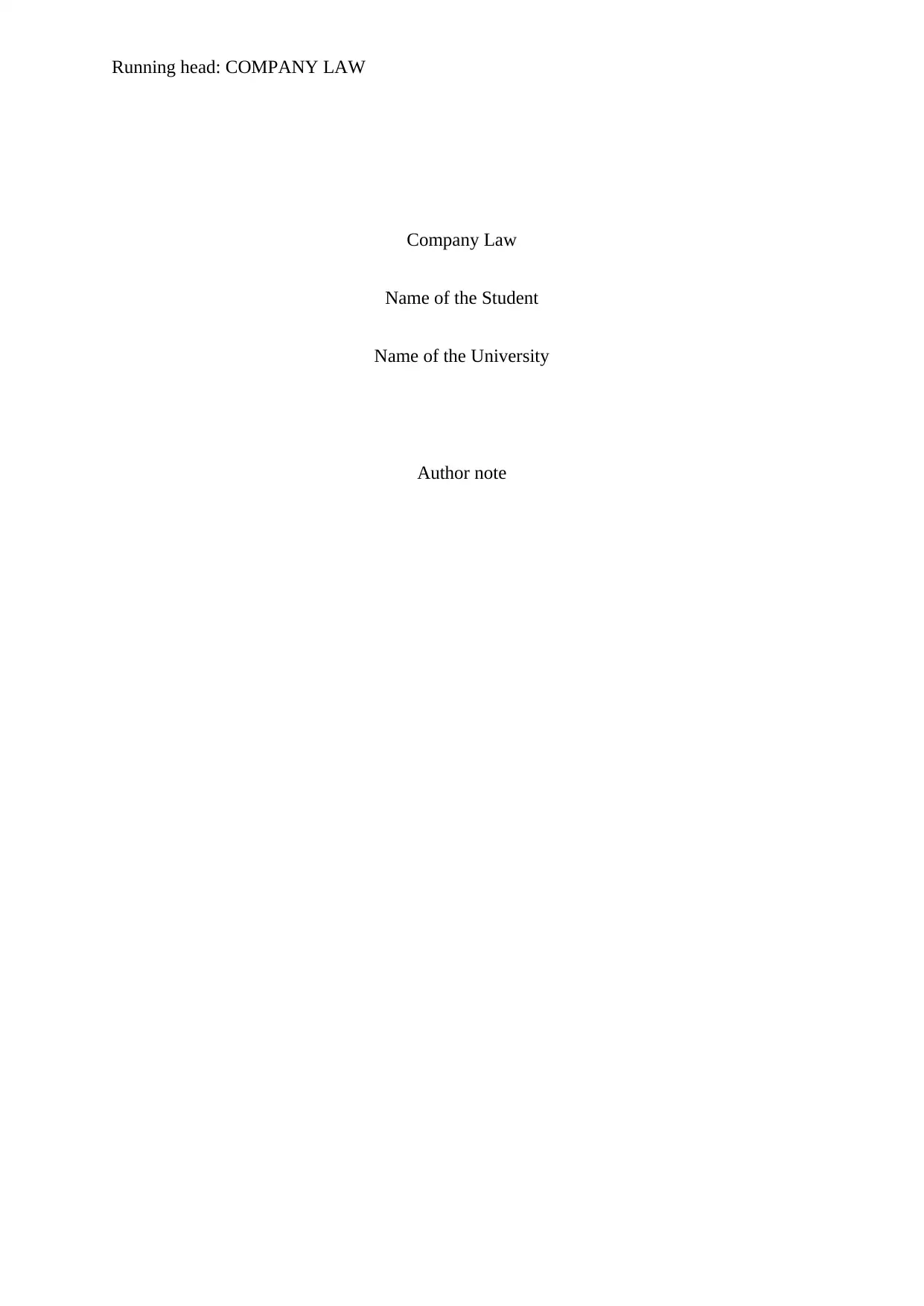
Running head: COMPANY LAW
Company Law
Name of the Student
Name of the University
Author note
Company Law
Name of the Student
Name of the University
Author note
Paraphrase This Document
Need a fresh take? Get an instant paraphrase of this document with our AI Paraphraser
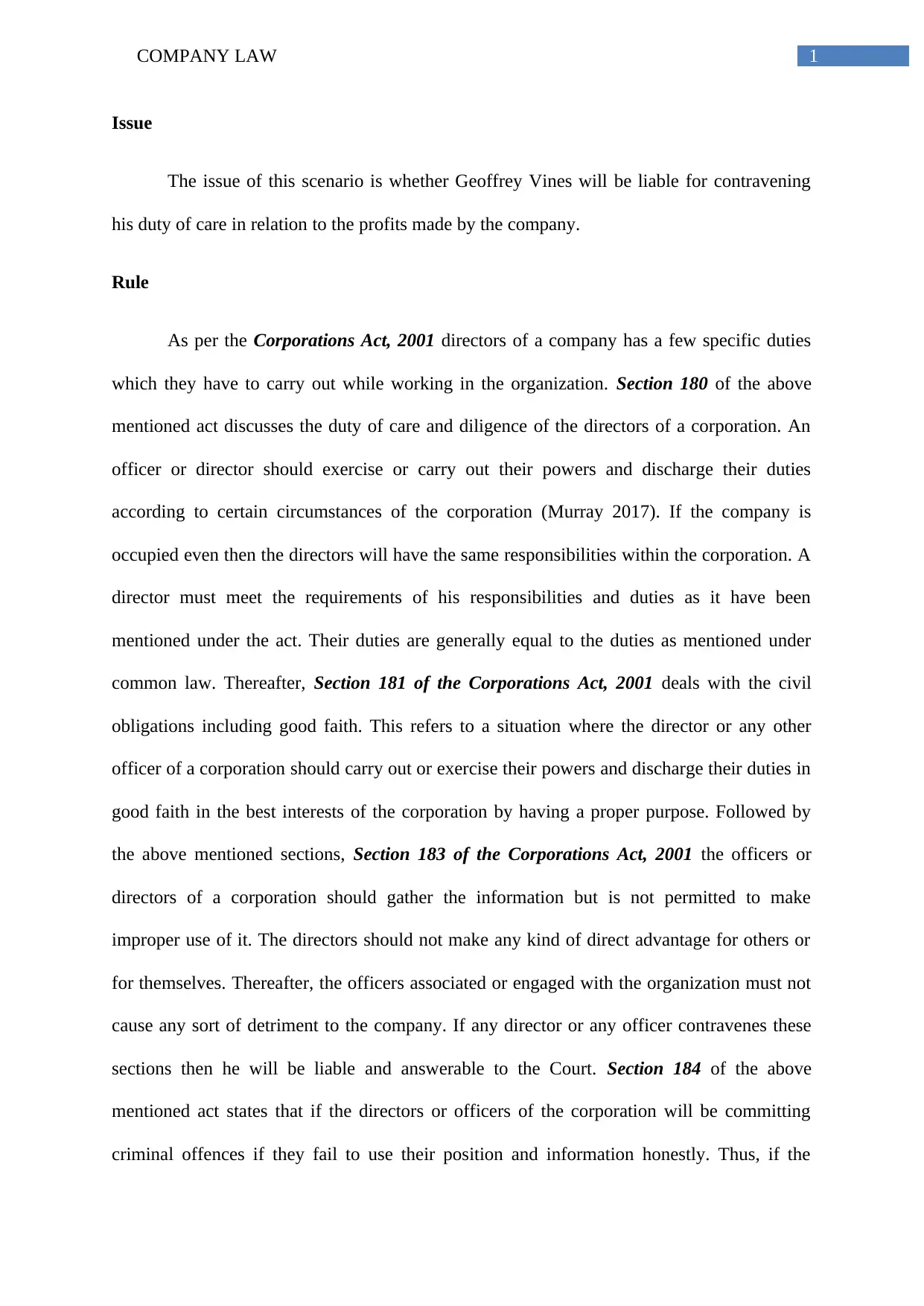
1COMPANY LAW
Issue
The issue of this scenario is whether Geoffrey Vines will be liable for contravening
his duty of care in relation to the profits made by the company.
Rule
As per the Corporations Act, 2001 directors of a company has a few specific duties
which they have to carry out while working in the organization. Section 180 of the above
mentioned act discusses the duty of care and diligence of the directors of a corporation. An
officer or director should exercise or carry out their powers and discharge their duties
according to certain circumstances of the corporation (Murray 2017). If the company is
occupied even then the directors will have the same responsibilities within the corporation. A
director must meet the requirements of his responsibilities and duties as it have been
mentioned under the act. Their duties are generally equal to the duties as mentioned under
common law. Thereafter, Section 181 of the Corporations Act, 2001 deals with the civil
obligations including good faith. This refers to a situation where the director or any other
officer of a corporation should carry out or exercise their powers and discharge their duties in
good faith in the best interests of the corporation by having a proper purpose. Followed by
the above mentioned sections, Section 183 of the Corporations Act, 2001 the officers or
directors of a corporation should gather the information but is not permitted to make
improper use of it. The directors should not make any kind of direct advantage for others or
for themselves. Thereafter, the officers associated or engaged with the organization must not
cause any sort of detriment to the company. If any director or any officer contravenes these
sections then he will be liable and answerable to the Court. Section 184 of the above
mentioned act states that if the directors or officers of the corporation will be committing
criminal offences if they fail to use their position and information honestly. Thus, if the
Issue
The issue of this scenario is whether Geoffrey Vines will be liable for contravening
his duty of care in relation to the profits made by the company.
Rule
As per the Corporations Act, 2001 directors of a company has a few specific duties
which they have to carry out while working in the organization. Section 180 of the above
mentioned act discusses the duty of care and diligence of the directors of a corporation. An
officer or director should exercise or carry out their powers and discharge their duties
according to certain circumstances of the corporation (Murray 2017). If the company is
occupied even then the directors will have the same responsibilities within the corporation. A
director must meet the requirements of his responsibilities and duties as it have been
mentioned under the act. Their duties are generally equal to the duties as mentioned under
common law. Thereafter, Section 181 of the Corporations Act, 2001 deals with the civil
obligations including good faith. This refers to a situation where the director or any other
officer of a corporation should carry out or exercise their powers and discharge their duties in
good faith in the best interests of the corporation by having a proper purpose. Followed by
the above mentioned sections, Section 183 of the Corporations Act, 2001 the officers or
directors of a corporation should gather the information but is not permitted to make
improper use of it. The directors should not make any kind of direct advantage for others or
for themselves. Thereafter, the officers associated or engaged with the organization must not
cause any sort of detriment to the company. If any director or any officer contravenes these
sections then he will be liable and answerable to the Court. Section 184 of the above
mentioned act states that if the directors or officers of the corporation will be committing
criminal offences if they fail to use their position and information honestly. Thus, if the
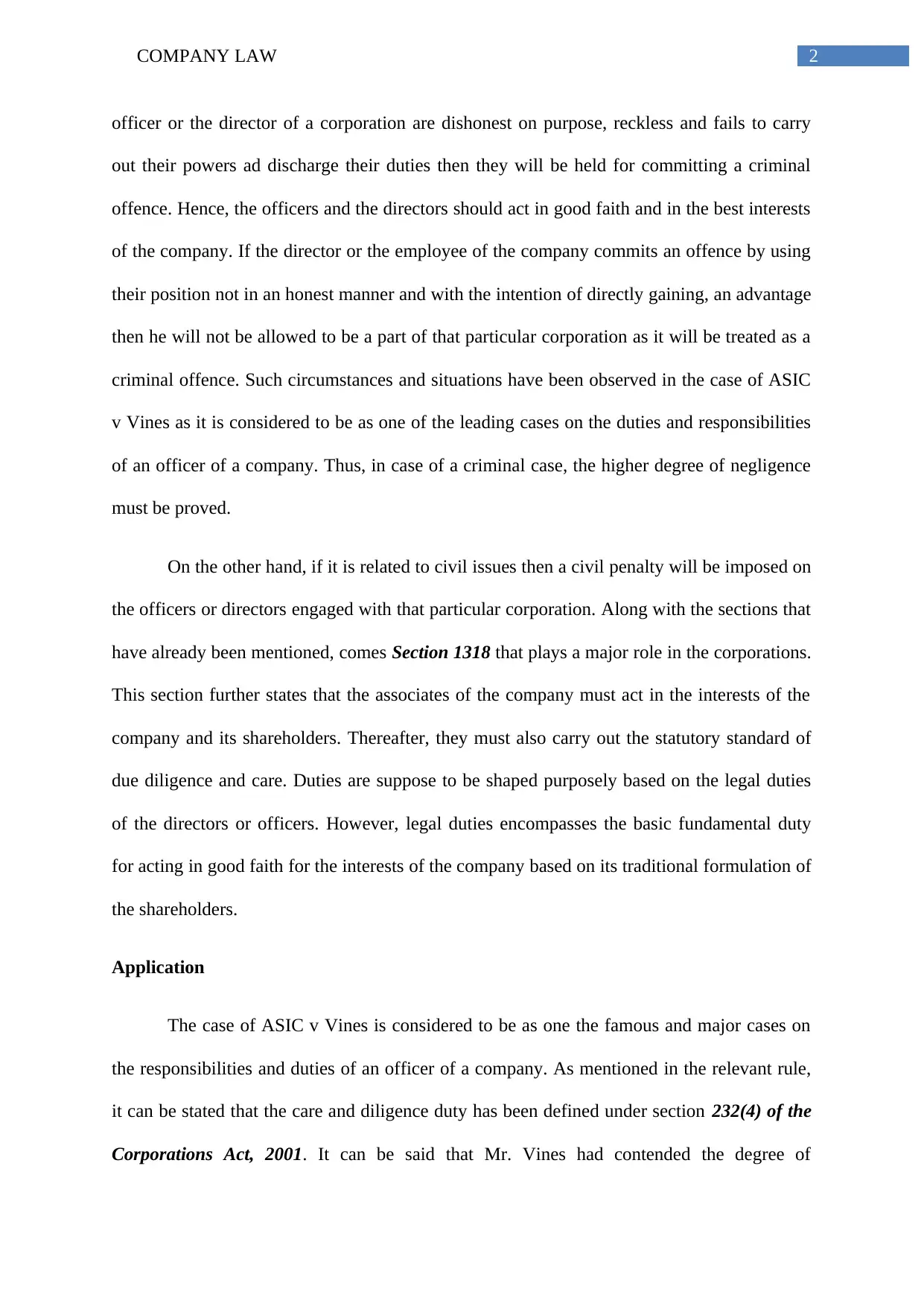
2COMPANY LAW
officer or the director of a corporation are dishonest on purpose, reckless and fails to carry
out their powers ad discharge their duties then they will be held for committing a criminal
offence. Hence, the officers and the directors should act in good faith and in the best interests
of the company. If the director or the employee of the company commits an offence by using
their position not in an honest manner and with the intention of directly gaining, an advantage
then he will not be allowed to be a part of that particular corporation as it will be treated as a
criminal offence. Such circumstances and situations have been observed in the case of ASIC
v Vines as it is considered to be as one of the leading cases on the duties and responsibilities
of an officer of a company. Thus, in case of a criminal case, the higher degree of negligence
must be proved.
On the other hand, if it is related to civil issues then a civil penalty will be imposed on
the officers or directors engaged with that particular corporation. Along with the sections that
have already been mentioned, comes Section 1318 that plays a major role in the corporations.
This section further states that the associates of the company must act in the interests of the
company and its shareholders. Thereafter, they must also carry out the statutory standard of
due diligence and care. Duties are suppose to be shaped purposely based on the legal duties
of the directors or officers. However, legal duties encompasses the basic fundamental duty
for acting in good faith for the interests of the company based on its traditional formulation of
the shareholders.
Application
The case of ASIC v Vines is considered to be as one the famous and major cases on
the responsibilities and duties of an officer of a company. As mentioned in the relevant rule,
it can be stated that the care and diligence duty has been defined under section 232(4) of the
Corporations Act, 2001. It can be said that Mr. Vines had contended the degree of
officer or the director of a corporation are dishonest on purpose, reckless and fails to carry
out their powers ad discharge their duties then they will be held for committing a criminal
offence. Hence, the officers and the directors should act in good faith and in the best interests
of the company. If the director or the employee of the company commits an offence by using
their position not in an honest manner and with the intention of directly gaining, an advantage
then he will not be allowed to be a part of that particular corporation as it will be treated as a
criminal offence. Such circumstances and situations have been observed in the case of ASIC
v Vines as it is considered to be as one of the leading cases on the duties and responsibilities
of an officer of a company. Thus, in case of a criminal case, the higher degree of negligence
must be proved.
On the other hand, if it is related to civil issues then a civil penalty will be imposed on
the officers or directors engaged with that particular corporation. Along with the sections that
have already been mentioned, comes Section 1318 that plays a major role in the corporations.
This section further states that the associates of the company must act in the interests of the
company and its shareholders. Thereafter, they must also carry out the statutory standard of
due diligence and care. Duties are suppose to be shaped purposely based on the legal duties
of the directors or officers. However, legal duties encompasses the basic fundamental duty
for acting in good faith for the interests of the company based on its traditional formulation of
the shareholders.
Application
The case of ASIC v Vines is considered to be as one the famous and major cases on
the responsibilities and duties of an officer of a company. As mentioned in the relevant rule,
it can be stated that the care and diligence duty has been defined under section 232(4) of the
Corporations Act, 2001. It can be said that Mr. Vines had contended the degree of
⊘ This is a preview!⊘
Do you want full access?
Subscribe today to unlock all pages.

Trusted by 1+ million students worldwide
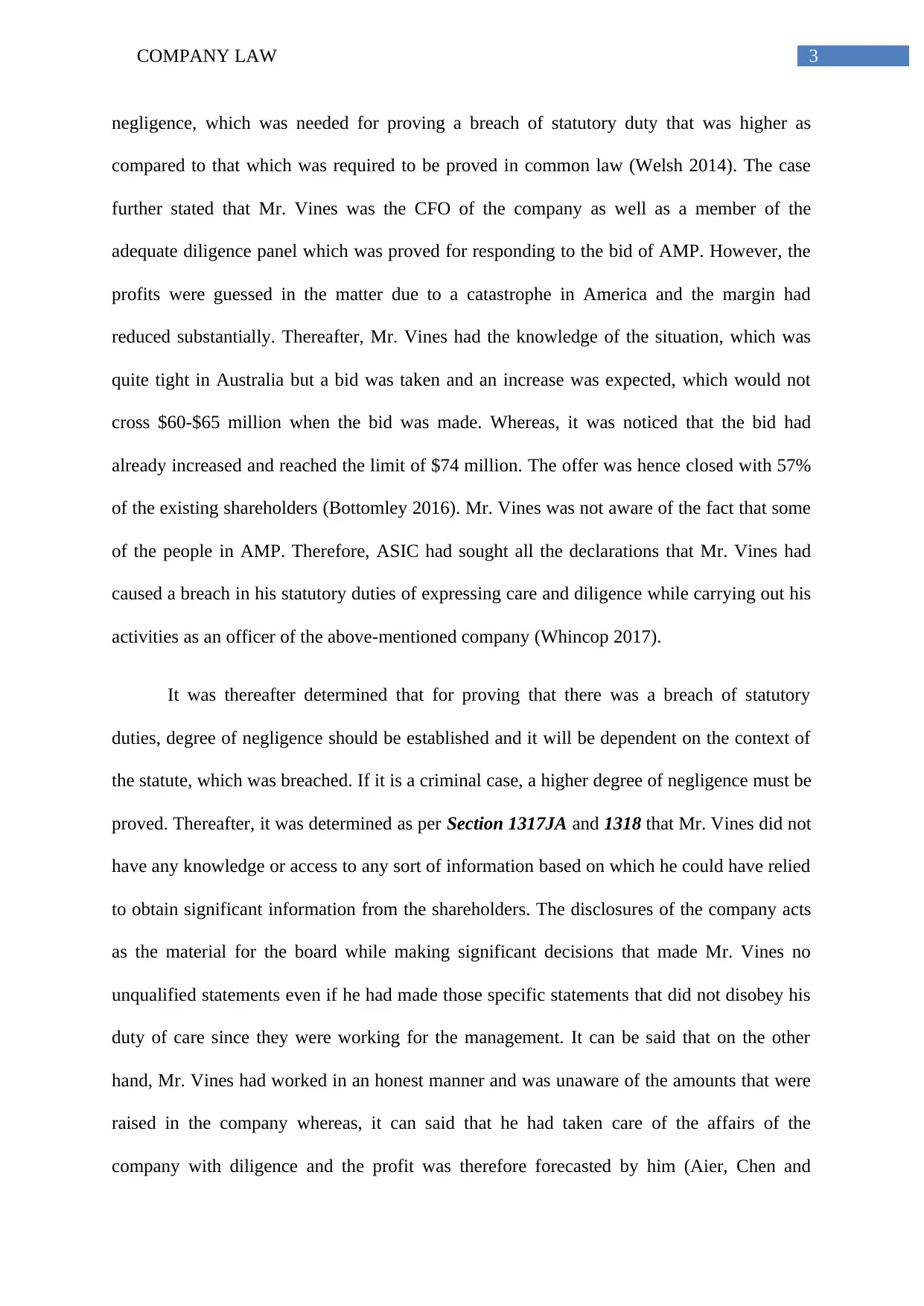
3COMPANY LAW
negligence, which was needed for proving a breach of statutory duty that was higher as
compared to that which was required to be proved in common law (Welsh 2014). The case
further stated that Mr. Vines was the CFO of the company as well as a member of the
adequate diligence panel which was proved for responding to the bid of AMP. However, the
profits were guessed in the matter due to a catastrophe in America and the margin had
reduced substantially. Thereafter, Mr. Vines had the knowledge of the situation, which was
quite tight in Australia but a bid was taken and an increase was expected, which would not
cross $60-$65 million when the bid was made. Whereas, it was noticed that the bid had
already increased and reached the limit of $74 million. The offer was hence closed with 57%
of the existing shareholders (Bottomley 2016). Mr. Vines was not aware of the fact that some
of the people in AMP. Therefore, ASIC had sought all the declarations that Mr. Vines had
caused a breach in his statutory duties of expressing care and diligence while carrying out his
activities as an officer of the above-mentioned company (Whincop 2017).
It was thereafter determined that for proving that there was a breach of statutory
duties, degree of negligence should be established and it will be dependent on the context of
the statute, which was breached. If it is a criminal case, a higher degree of negligence must be
proved. Thereafter, it was determined as per Section 1317JA and 1318 that Mr. Vines did not
have any knowledge or access to any sort of information based on which he could have relied
to obtain significant information from the shareholders. The disclosures of the company acts
as the material for the board while making significant decisions that made Mr. Vines no
unqualified statements even if he had made those specific statements that did not disobey his
duty of care since they were working for the management. It can be said that on the other
hand, Mr. Vines had worked in an honest manner and was unaware of the amounts that were
raised in the company whereas, it can said that he had taken care of the affairs of the
company with diligence and the profit was therefore forecasted by him (Aier, Chen and
negligence, which was needed for proving a breach of statutory duty that was higher as
compared to that which was required to be proved in common law (Welsh 2014). The case
further stated that Mr. Vines was the CFO of the company as well as a member of the
adequate diligence panel which was proved for responding to the bid of AMP. However, the
profits were guessed in the matter due to a catastrophe in America and the margin had
reduced substantially. Thereafter, Mr. Vines had the knowledge of the situation, which was
quite tight in Australia but a bid was taken and an increase was expected, which would not
cross $60-$65 million when the bid was made. Whereas, it was noticed that the bid had
already increased and reached the limit of $74 million. The offer was hence closed with 57%
of the existing shareholders (Bottomley 2016). Mr. Vines was not aware of the fact that some
of the people in AMP. Therefore, ASIC had sought all the declarations that Mr. Vines had
caused a breach in his statutory duties of expressing care and diligence while carrying out his
activities as an officer of the above-mentioned company (Whincop 2017).
It was thereafter determined that for proving that there was a breach of statutory
duties, degree of negligence should be established and it will be dependent on the context of
the statute, which was breached. If it is a criminal case, a higher degree of negligence must be
proved. Thereafter, it was determined as per Section 1317JA and 1318 that Mr. Vines did not
have any knowledge or access to any sort of information based on which he could have relied
to obtain significant information from the shareholders. The disclosures of the company acts
as the material for the board while making significant decisions that made Mr. Vines no
unqualified statements even if he had made those specific statements that did not disobey his
duty of care since they were working for the management. It can be said that on the other
hand, Mr. Vines had worked in an honest manner and was unaware of the amounts that were
raised in the company whereas, it can said that he had taken care of the affairs of the
company with diligence and the profit was therefore forecasted by him (Aier, Chen and
Paraphrase This Document
Need a fresh take? Get an instant paraphrase of this document with our AI Paraphraser
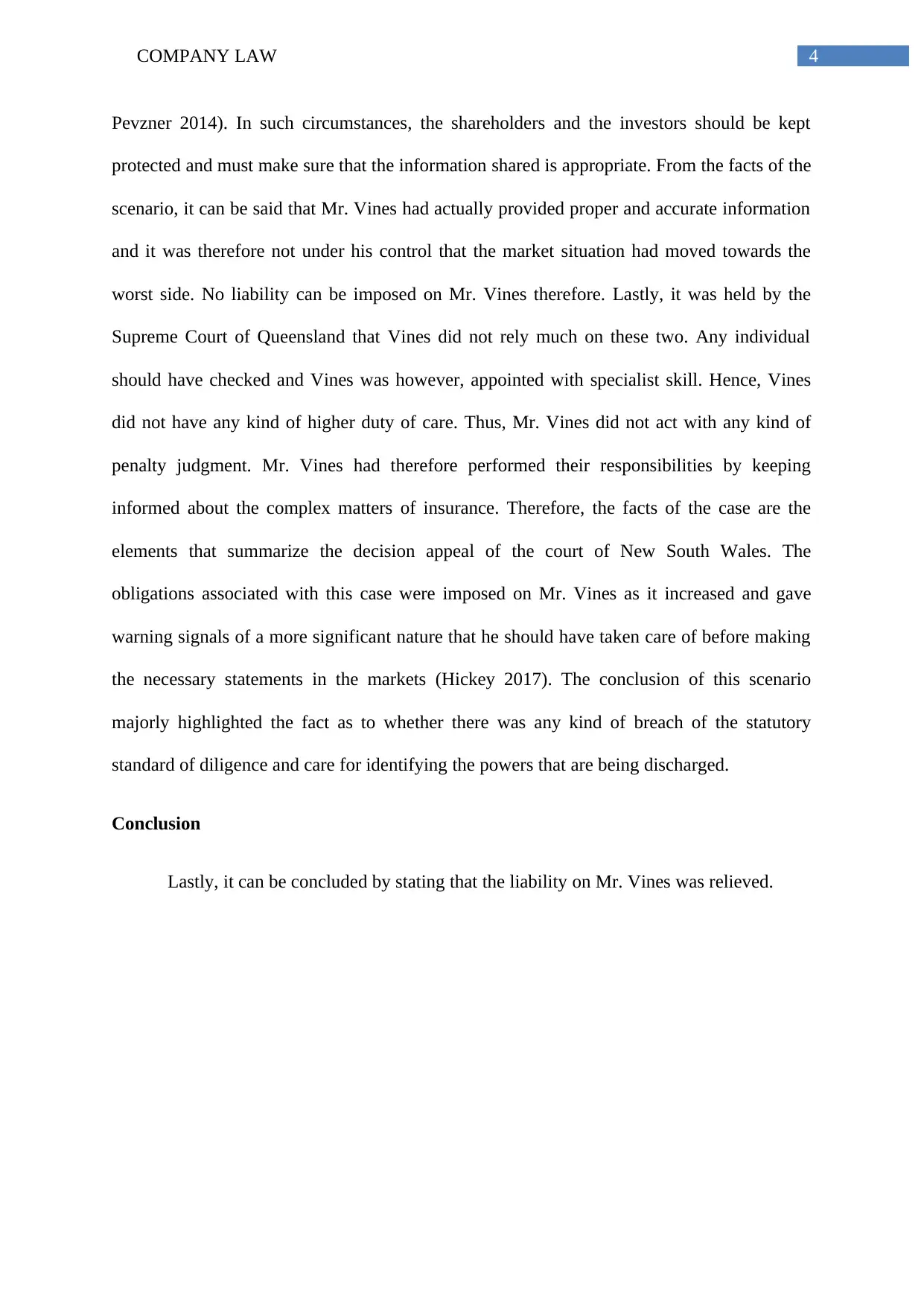
4COMPANY LAW
Pevzner 2014). In such circumstances, the shareholders and the investors should be kept
protected and must make sure that the information shared is appropriate. From the facts of the
scenario, it can be said that Mr. Vines had actually provided proper and accurate information
and it was therefore not under his control that the market situation had moved towards the
worst side. No liability can be imposed on Mr. Vines therefore. Lastly, it was held by the
Supreme Court of Queensland that Vines did not rely much on these two. Any individual
should have checked and Vines was however, appointed with specialist skill. Hence, Vines
did not have any kind of higher duty of care. Thus, Mr. Vines did not act with any kind of
penalty judgment. Mr. Vines had therefore performed their responsibilities by keeping
informed about the complex matters of insurance. Therefore, the facts of the case are the
elements that summarize the decision appeal of the court of New South Wales. The
obligations associated with this case were imposed on Mr. Vines as it increased and gave
warning signals of a more significant nature that he should have taken care of before making
the necessary statements in the markets (Hickey 2017). The conclusion of this scenario
majorly highlighted the fact as to whether there was any kind of breach of the statutory
standard of diligence and care for identifying the powers that are being discharged.
Conclusion
Lastly, it can be concluded by stating that the liability on Mr. Vines was relieved.
Pevzner 2014). In such circumstances, the shareholders and the investors should be kept
protected and must make sure that the information shared is appropriate. From the facts of the
scenario, it can be said that Mr. Vines had actually provided proper and accurate information
and it was therefore not under his control that the market situation had moved towards the
worst side. No liability can be imposed on Mr. Vines therefore. Lastly, it was held by the
Supreme Court of Queensland that Vines did not rely much on these two. Any individual
should have checked and Vines was however, appointed with specialist skill. Hence, Vines
did not have any kind of higher duty of care. Thus, Mr. Vines did not act with any kind of
penalty judgment. Mr. Vines had therefore performed their responsibilities by keeping
informed about the complex matters of insurance. Therefore, the facts of the case are the
elements that summarize the decision appeal of the court of New South Wales. The
obligations associated with this case were imposed on Mr. Vines as it increased and gave
warning signals of a more significant nature that he should have taken care of before making
the necessary statements in the markets (Hickey 2017). The conclusion of this scenario
majorly highlighted the fact as to whether there was any kind of breach of the statutory
standard of diligence and care for identifying the powers that are being discharged.
Conclusion
Lastly, it can be concluded by stating that the liability on Mr. Vines was relieved.
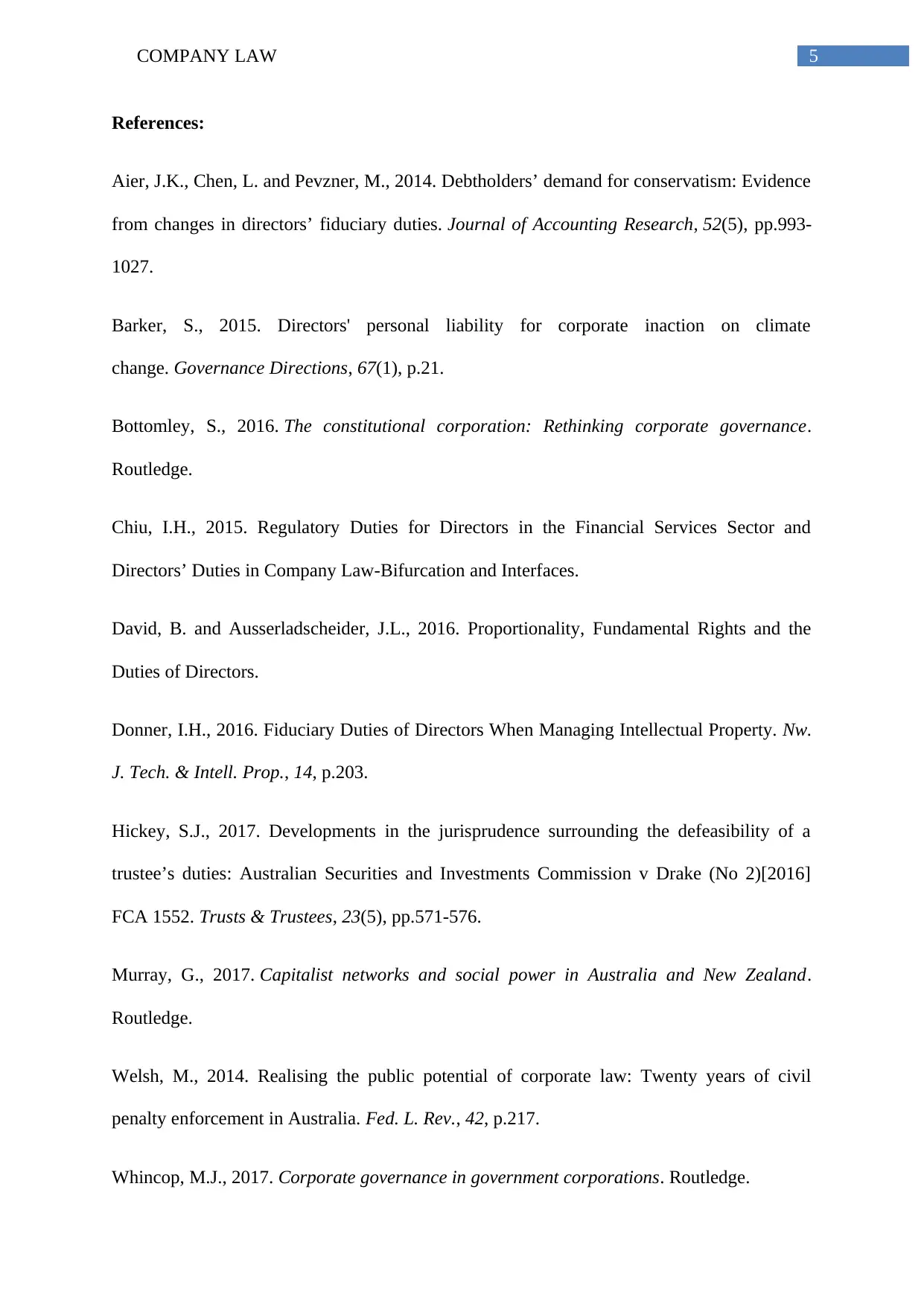
5COMPANY LAW
References:
Aier, J.K., Chen, L. and Pevzner, M., 2014. Debtholders’ demand for conservatism: Evidence
from changes in directors’ fiduciary duties. Journal of Accounting Research, 52(5), pp.993-
1027.
Barker, S., 2015. Directors' personal liability for corporate inaction on climate
change. Governance Directions, 67(1), p.21.
Bottomley, S., 2016. The constitutional corporation: Rethinking corporate governance.
Routledge.
Chiu, I.H., 2015. Regulatory Duties for Directors in the Financial Services Sector and
Directors’ Duties in Company Law-Bifurcation and Interfaces.
David, B. and Ausserladscheider, J.L., 2016. Proportionality, Fundamental Rights and the
Duties of Directors.
Donner, I.H., 2016. Fiduciary Duties of Directors When Managing Intellectual Property. Nw.
J. Tech. & Intell. Prop., 14, p.203.
Hickey, S.J., 2017. Developments in the jurisprudence surrounding the defeasibility of a
trustee’s duties: Australian Securities and Investments Commission v Drake (No 2)[2016]
FCA 1552. Trusts & Trustees, 23(5), pp.571-576.
Murray, G., 2017. Capitalist networks and social power in Australia and New Zealand.
Routledge.
Welsh, M., 2014. Realising the public potential of corporate law: Twenty years of civil
penalty enforcement in Australia. Fed. L. Rev., 42, p.217.
Whincop, M.J., 2017. Corporate governance in government corporations. Routledge.
References:
Aier, J.K., Chen, L. and Pevzner, M., 2014. Debtholders’ demand for conservatism: Evidence
from changes in directors’ fiduciary duties. Journal of Accounting Research, 52(5), pp.993-
1027.
Barker, S., 2015. Directors' personal liability for corporate inaction on climate
change. Governance Directions, 67(1), p.21.
Bottomley, S., 2016. The constitutional corporation: Rethinking corporate governance.
Routledge.
Chiu, I.H., 2015. Regulatory Duties for Directors in the Financial Services Sector and
Directors’ Duties in Company Law-Bifurcation and Interfaces.
David, B. and Ausserladscheider, J.L., 2016. Proportionality, Fundamental Rights and the
Duties of Directors.
Donner, I.H., 2016. Fiduciary Duties of Directors When Managing Intellectual Property. Nw.
J. Tech. & Intell. Prop., 14, p.203.
Hickey, S.J., 2017. Developments in the jurisprudence surrounding the defeasibility of a
trustee’s duties: Australian Securities and Investments Commission v Drake (No 2)[2016]
FCA 1552. Trusts & Trustees, 23(5), pp.571-576.
Murray, G., 2017. Capitalist networks and social power in Australia and New Zealand.
Routledge.
Welsh, M., 2014. Realising the public potential of corporate law: Twenty years of civil
penalty enforcement in Australia. Fed. L. Rev., 42, p.217.
Whincop, M.J., 2017. Corporate governance in government corporations. Routledge.
⊘ This is a preview!⊘
Do you want full access?
Subscribe today to unlock all pages.

Trusted by 1+ million students worldwide
1 out of 6
Related Documents
Your All-in-One AI-Powered Toolkit for Academic Success.
+13062052269
info@desklib.com
Available 24*7 on WhatsApp / Email
![[object Object]](/_next/static/media/star-bottom.7253800d.svg)
Unlock your academic potential
Copyright © 2020–2026 A2Z Services. All Rights Reserved. Developed and managed by ZUCOL.




![Analysis of Fodare Pyt Ltd. V Shearn [2011] NSWSC 479 Case](/_next/image/?url=https%3A%2F%2Fdesklib.com%2Fmedia%2Fimages%2Fto%2Fc003c47972d54ac499b6fca5329d3bb6.jpg&w=256&q=75)
